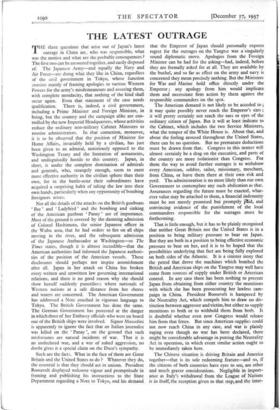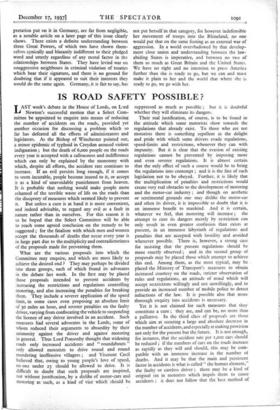THE LATEST OUTRAGE
THE three questions that arise out of Japan's latest outrage in China are, who was responsible, what was the motive and what are the probable consequences ?
The first two can be answered together, and easily disposed of. The Japanese Army—and equally the Navy and Air Force—are doing what they like in China, regardless of the civil government in Tokyo, whose function consists mainly of framing apologies to various Western Powers for the army's misdemeanours and assuring them, with complete mendacity, that nothing of the kind shall occur again. Even that statement of the case needs qualification. There is, indeed, a civil government, including a Prime Minister and Foreign Minister, in being, but the country and the campaign alike are con- trolled by the new Imperial Headquarters, whose activities reduce the ordinary non-military Cabinet Ministers to routine administrators. In that connexion, moreover, it is to be observed that the position of Minister for Home Affairs, invariably held by a civilian, has just been given to an admiral, notoriously opposed to the Washington Treaty and the limitation of armaments, and undisguisedly hostile to this country. Japan, in short, is under the complete domination of admirals and generals, who, strangely enough, seem to exert more effective authority in the civilian sphere than their own, for in the battle-zone their subordinates have acquired a surprising habit of taking the law into their own hands, particularly when any opportunity of bombing foreigners arises.
Not all the details of the attacks on the British gunboats ' Bee ' and ' Ladybird ' and the bombing and sinking.
of the American gunboat ' Panay ' are of importance. Most of the ground is covered by the damning admission of Colonel Hashimoto, the senior Japanese officer in the Wuhu area, that he had orders to fire on all ships moving in the river, and the subsequent admission of the Japanese Ambassador at Washington—so The Times states, though it is almost incredible—that the American authorities had informed the Japanese authori- ties of the position of the American vessels. These disclosures should perhaps not inspire astonishment after all. Japan in her attack on China has broken every written and unwritten law governing international relations, and there is no good reason why she should show herself suddenly punctilions where nationals of Western nations at a safe distance from her shores and waters are concerned. The American Government has addressed a Note couched in vigorous language to Tokyo. The British Government has done the same.
The German Government has protested at the danger in which three of her Embassy officials who were on board one of the British ships were involved. Signor Mussolini is apparently to ignore the fact that an Italian journalist was killed on the ' Panay ', on the ground that such misfortunes are natural incidents of war. That it is an undeclared war, and a war of naked aggression, no doubt gives it a special claim on the Duce's sympathy.
Such are the facts. What in the face of them are Great Britain and the United States to do ? Whatever they do, the essential is that they should act in unison. President Roosevelt displayed welcome vigour and promptitude in framing and publishing his instructions to the State Department regarding a Note to Tokyo, and his demand that the Emperor of Japan should personally express regret for the outrages on the Yangtse was a singularly sound diplomatic move. Apologies from the Foreign Minister can be had for the asking—had, indeed, before they are formally asked for at all. They are available by the bushel, and so far as effect on the army and navy is concerned they mean precisely nothing. But the Ministers for War and Marine hold office directly under the Emperor ; any apology from him would implicate them and necessitate firm action by them against the responsible, commanders on the spot.
The American demand is not likely to be acceded to ; it may quite possibly never reach the Emperor's ears ; it will pretty certainly not reach the ears or eyes of the ordinary citizen of Japan. But it will at least indicate to the Cabinet, which includes the two Service Ministers, what the temper of the White House is. About that, and about the feeling aroused throughout the United States, there can be no question. But no premature deductions must be drawn from that. Congress in this matter will almost certainly be a drag on the executive, and parts_ of the country are more isolationist than Congress. For them the way to avoid further outrages is to withdraw every American, soldier, sailor, missionary, merchant, from China, or leave them there at their own risk and peril. The administration is no more likely than our own Government to contemplate any such abdication as that. Assurances regarding the future must be exacted, what:. ever value may be attached to them, a financial indemnity must be not merely promised but promptly Aid, and convincing evidence of the punishment of the local commanders responsible for the outrages must be forthcoming.
That is little enough, but it has to be plainly recognised that neither Great Britain nor the United States is in a position to bring military pressure to bear on Japan. But they are both in a position to bring effective economic pressure to bear on her, and it is to be hoped that the possibilities underlying that fact are being fully explored on both sides of the Atlantic. It is a sinister irony that the petrol that drove the machines which bombed the British and American ships on the Yangtse may well have come from sources of supply under British or Anlerican control. In any case there has been nothing to prevent Japan from obtaining from either country the munitions with which she has been prosecuting her lawless cam- paign in China. President Roosevelt is hampered by the Neutrality Act, which compels him to draw no dis- tinction between aggressor and victim, but either to supply munitions to both or to withhold them from both. It is doubtful whether even now Congress would release him from that fetter. But since American supplies could not now reach China in any case, and war is " plainly raging even though no war has been declared, there might be considerable advantage in putting the Neutrality Act in operation, in which event similar action ought to be immediately taken here.
The Chinese situation is driving Britain and America together—that is its sole redeeming feature—and so, if the citizens of both countries have eyes to see, are other and much graver considerations. Negligible in import- ance as Italy's withdrawal from the League of Nations is in itself, the reception given to that step, and the inter:- pretation put on it in Germany, are far from negligible, as a notable article on a later page of this issue clearly shows. There exists a definite understanding between three Great Powers, of which two have shown them- selves cynically and blatantly indifferent to their pledged word and utterly regardless of any moral factor in the relationships between States. They have levied war on unaggressive neighbours in criminal violation of treaties which bear their signature, and there is no ground for doubting that if it appeared to suit their interests they would do the same again. Germany, it is fair to say, has not put herself in that category, for however indefensible her movement of troops into the Rhineland, no one would put that on the same footing as an external war of aggression. In a world overshadowed by that develop- ment close union and understanding between the law- abiding States is imperative, and between no two of them so much as Great Britain and the United States. We have no right and no intention to press America further than she is ready to go, but we can and must make it plain to her and the world that where she is ready to go, we go with her.















































 Previous page
Previous page